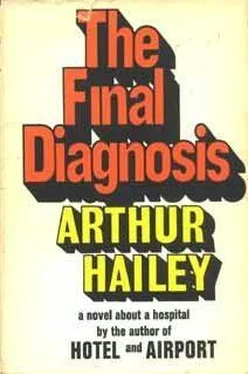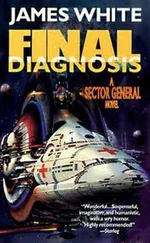Arthur Hailey - The Final Diagnosis
Здесь есть возможность читать онлайн «Arthur Hailey - The Final Diagnosis» весь текст электронной книги совершенно бесплатно (целиком полную версию без сокращений). В некоторых случаях можно слушать аудио, скачать через торрент в формате fb2 и присутствует краткое содержание. Жанр: Триллер, на английском языке. Описание произведения, (предисловие) а так же отзывы посетителей доступны на портале библиотеки ЛибКат.
- Название:The Final Diagnosis
- Автор:
- Жанр:
- Год:неизвестен
- ISBN:нет данных
- Рейтинг книги:4 / 5. Голосов: 1
-
Избранное:Добавить в избранное
- Отзывы:
-
Ваша оценка:
- 80
- 1
- 2
- 3
- 4
- 5
The Final Diagnosis: краткое содержание, описание и аннотация
Предлагаем к чтению аннотацию, описание, краткое содержание или предисловие (зависит от того, что написал сам автор книги «The Final Diagnosis»). Если вы не нашли необходимую информацию о книге — напишите в комментариях, мы постараемся отыскать её.
The Final Diagnosis — читать онлайн бесплатно полную книгу (весь текст) целиком
Ниже представлен текст книги, разбитый по страницам. Система сохранения места последней прочитанной страницы, позволяет с удобством читать онлайн бесплатно книгу «The Final Diagnosis», без необходимости каждый раз заново искать на чём Вы остановились. Поставьте закладку, и сможете в любой момент перейти на страницу, на которой закончили чтение.
Интервал:
Закладка:
“Yes.” Lucy nodded. “It’s Joe’s idea that something”—she hesitated, aware that Vivian would hear her words—“might have become visible in the meantime.”
“It’s possible.” Bell had crossed to the nursing station and was scribbling an X-ray requisition. He asked a girl clerk behind the desk, “Which technicians are free?”
She consulted a list. “There’s Jane or Mr. Firban.”
“I think we’ll have Firban do this one. Will you find him, please?” He turned to Lucy as they moved back toward the stretcher. “Firban’s one of our best technicians, and we want good films.” He smiled at Vivian. “Dr. Pearson-asked me to take a personal interest in this case, so that’s what I’m doing. Now let’s go in this room over here.”
With help from Bell the nurse guided the stretcher out of the reception area and into a larger room opening from it. Most of the room was taken up by an X-ray table, with the machine’s picture tube above and suspended on overhead rollers. In an adjoining smaller section, behind thick glass, Vivian could see an electric control panel. Almost at once they were followed into the room by a short, youngish man with crew-cut hair and wearing a white lab coat. His movements were jerky and hurried, as though he wished to achieve whatever he was doing quickly but with a minimum of energy expended. He glanced at Vivian, then turned to Bell.
“Yes, Dr. Bell?”
“Oh, Karl, I’d like you to handle this case for me. By the way, do you know Dr. Grainger?” To Lucy, “This is Karl Firban.”
“I don’t think we’ve met.” Lucy offered her hand and the technician took it.
“How do you do, Doctor.”
“And our patient is Vivian Loburton.” Bell smiled down at the stretcher. “She’s a student nurse. That’s why we’re making such a fuss over her.”
“Hullo, Vivian.” Firban’s greeting was as taut as his other actions. Now, swinging the X-ray table from a vertical position to horizontal, he talked on with brisk brightness. “For special customers we offer a choice of Vista Vision or CinemaScope—all in glorious gray and black.” He glanced at the requisition which Bell had put down. “The left knee, eh? Anything special, Doctor?”
“We’ll want some good A.P., lateral and oblique views, and then I think a coned-down view of the knee area.” Bell paused and considered. “I’d say about five or six films, and then duplicates of the opposite extremity.”
“Do you want any views on a fourteen by seventeen, to include the anterior tibia and fibula?”
Bell considered, then nodded. “That might be a good idea.” To Lucy he said, “If it’s osteomyelitis there could be periosteal reaction further down the bone.”
“All right, Doctor. I’ll have something for you in half an hour.” It was a polite hint from Firban that he preferred to work alone, and the radiologist accepted it.
“We’ll have a coffee and come back.” Bell smiled in Vivian’s direction. “You’re in good hands.” Then, with Lucy ahead of him, he went outside.
“All righty. Let’s get to work.” The technician motioned to the nurse, and together they eased Vivian from the stretcher to the X-ray table. After the stretcher’s comparative softness the black ebonite table felt hard and unyielding.
“Not so comfortable, eh?” Firban was moving Vivian carefully into the position he wanted, leaving her left knee exposed. As she shook her head he went on, “You get used to it. I’ve slept on this table plenty of times when I’ve been on night duty and things have been quiet.” He nodded to the nurse, and the girl went to wait behind the glassed-in section.
With Vivian watching, the technician went through the routine movements of an X-ray series. Still with the same swift jerkiness, he took a film casette from an upright container built into the wall, inserting it deftly in a tray beneath the X-ray table. Next he positioned the tray below the area of Vivian’s knee. Then, using press-button controls suspended from the ceiling by a heavy electrical cord, he maneuvered the heavy X-ray tube along its rollers and downward, until it was immediately above the knee, the arrow on the machine’s calibrated height scale pointing to forty inches.
In contrast to so much else in the hospital, Vivian thought, this room appeared almost unearthlike and remote. The shining black and chrome machinery seemed monstrous as it slid slowly and in massive murmur. There was an aura of science and neutrality in this place, in a way as remote from medicine as a great ship’s engine room might seem from a sunlit bridge deck far above. And yet here, with these ominous, ponderous instruments, so much of medicine’s real detective work was done. The thought for a moment frightened her. There was a dreadful impersonality in it all, so little of people in these machines. Whatever they might discover was relayed and reported without warmth or pleasure, without sadness or regret. Good, bad—it was all the same. For a moment she fancied the picture tube suspended above her to be an eye of judgment, inflexible, dispassionate. What was its judgment now? Would there be hope, or even reprieve . . . or a solemn sentence from which there could be no appeal? Again she found herself wishing for Mike; she would call him as soon as she returned to the hospital room.
The technician had finished his preparation. “I think that will do.” He took a final look around. “I’ll tell you when to keep perfectly still. This is the only place in the hospital, you know, where we can say you won’t feel a thing and really mean it.”
Now he moved behind the inch-thick glass screen which protected the X-ray operator from radiation. Out of the periphery of her vision Vivian could see him moving, holding a check list, setting switches.
At the master control panel Firban was thinking: A pretty kid. Wonder what’s wrong. Must be something serious for Bell to take all that interest; usually the chief doesn’t pay attention to patients until after the films are made. He double-checked the panel controls; in this work you acquired the habit of taking no chances. Settings were okay—84 kilovolts, 200 milliamps, exposure time fifteen hundredths of a second. He pressed a button which set the rotating anode of the picture tube in motion. Then calling out the familiar formula, “Don’t move! Keep still!” he thumbed the second button and knew that whatever was to be seen by the osmotic eye of X-ray was recorded now for others to evaluate.
In the X-O-Mat room of Radiology, the Venetian blinds lowered to cut off the light from outside, Drs. Bell and Lucy Grainger were waiting. In a few minutes the films which Firban had taken would be ready for comparison with those of two weeks before. The technician had already fed his undeveloped negatives into the autodeveloping machine, and at this moment, looking somewhat like an oversized oil furnace, its interior was humming. Now, one by one, the developed films began to fall too a slot at the front of the machine.
As each film appeared Bell placed it under the clip of a viewing box, lighted by fluorescent tubes behind. On a second viewing box, immediately above, he had already put in position the earlier films.
“Did we get good pictures?” There was a touch of pride in the technician’s question.
“Very good indeed.” It was a reflex answer; Bell was already studying the new negatives intently, then comparing the corresponding areas in the two sets of films. He used a pencil point to aid his own thought process and so that Lucy could follow him.
When they had gone over both sets completely, Lucy asked, “Do you see any difference? I can’t, I’m afraid.”
The radiologist shook his head. “There’s a little periosteal reaction here.” He pointed with the pencil to a slight difference in gray shading at two points. “But that’s probably the result of your own biopsy. Otherwise there’s been no conclusive change.” Bell removed his heavy glasses and rubbed his right eye. He said, almost apologetically, “I’m sorry, Lucy; I guess I have to throw the ball back at Pathology. Will you tell Joe Pearson, or shall I?” He began to take down the two sets of films.
Читать дальшеИнтервал:
Закладка:
Похожие книги на «The Final Diagnosis»
Представляем Вашему вниманию похожие книги на «The Final Diagnosis» списком для выбора. Мы отобрали схожую по названию и смыслу литературу в надежде предоставить читателям больше вариантов отыскать новые, интересные, ещё непрочитанные произведения.
Обсуждение, отзывы о книге «The Final Diagnosis» и просто собственные мнения читателей. Оставьте ваши комментарии, напишите, что Вы думаете о произведении, его смысле или главных героях. Укажите что конкретно понравилось, а что нет, и почему Вы так считаете.












